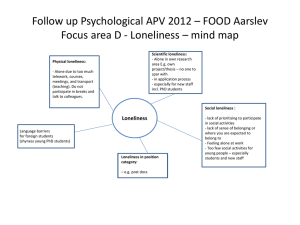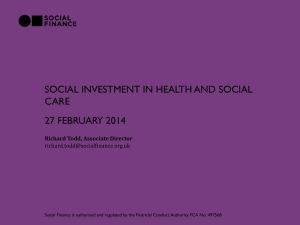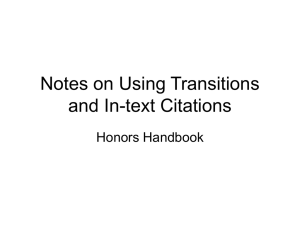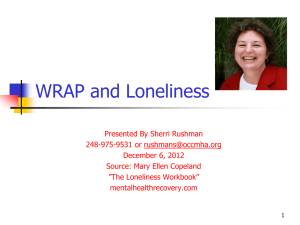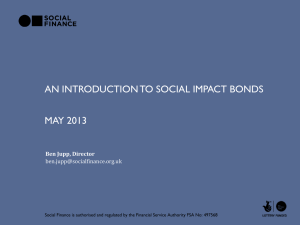Presentation 3
advertisement
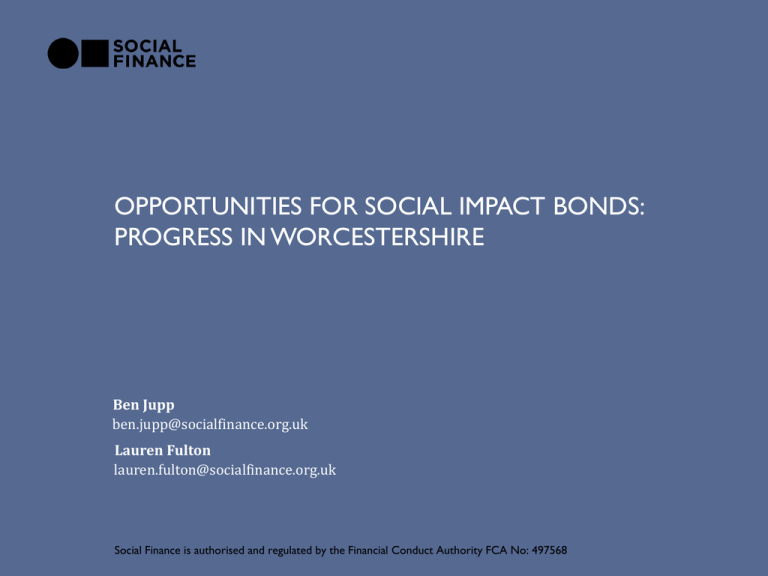
OPPORTUNITIES FOR SOCIAL IMPACT BONDS: PROGRESS IN WORCESTERSHIRE Ben Jupp ben.jupp@socialfinance.org.uk Lauren Fulton lauren.fulton@socialfinance.org.uk Social Finance is authorised and regulated by the Financial Conduct Authority FCA No: 497568 2 INTRODUCTION AND TERMINOLOGY 1) Social Finance an independent not-for profit organisation social investment 2) social investment money that is provided on the basis of social and financial return Social Impact Bonds 3) Social Impact Bonds ©Social Finance 2013 One way in which social investment is deployed; a social investment “product” other forms of social investment 3 KEY PRINCIPALS OF SOCIAL IMPACT BONDS Social Impact Bonds are a response to systematic underinvestment in prevention across public services. • The Social Impact Bond is a means of investing in prevention services where improved social outcomes are likely but not certain. • Social Impact Bonds are contracts with public sector commissioners under which government commits to pay for improved social outcomes. • On the back of this contract, investment is raised from non-governmental investors. • This investment is used to pay upfront for a range of interventions to improve social outcomes. • Investors are repaid only if successful outcomes are achieved. Investors stand to lose some or all of their capital if positive outcomes are not achieved. • The investor takes the risk that the interventions do not deliver the desired outcomes. The greater the improvement, the greater the financial return to investors. ©Social Finance 2013 SOCIAL IMPACT BONDS BRING NEW FUNDING TO COMPLEX SOCIAL PROBLEMS AND FOCUS ALL STAKEHOLDERS ON PREVENTION UK COMMISSIONED SIBS 4 7 1215 2 5 1 14 11 13 8 10 3 9 6 1 Ministry of Justice – Peterborough Reducing reoffending 2 DWP – West Midlands Disadvantaged 14-24 year-olds 3 DWP – Stratford and surrounds Disadvantaged 14-24 year-olds 4 DWP – Perthshire and Kinross Disadvantaged 14-24 year-olds 5 DWP – Nottingham City Disadvantaged 14-24 year-olds 6 DWP – Shoreditch, London Disadvantaged 14-24 year-olds 7 DWP – Greater Merseyside Disadvantaged 14-24 year-olds 8 Essex County Council – Essex Children at risk of going into care 9 Greater London Authority – London Rough sleepers 10 DWP – West London boroughs Disadvantaged 14-15 year-olds 11 DWP – Cardiff and Newport Disadvantaged 14-15 year-olds 12 DWP – Greater Manchester Disadvantaged 14-15 year-olds 13 DWP – Thames Valley Disadvantaged 14-15 year-olds CVAA – England-wide Adoption Manchester City Council Children in Care In development 14 15 ©Social Finance 2013 Source: emmatomkinson.com 4 5 LONELINESS AS AN AREA OF UNDERINVESTMENT Loneliness has an equivalent impact on mortality as smoking 15 cigarettes a day. Preventing loneliness and isolation should enable older people to stay active and reduce periods of ill health and disability. In developing the Social Impact Bond we have reviewed a number of impacts in order to assess the likely benefits in reducing loneliness. Potential value to local and national stakeholders Mechanism which directly impacts service usage. GP visits, A&E visits, hospital admissions Lack of support structures Increased likelihood of entry to care Dementia Loneliness* Short term health care costs of treatment Depression Diabetes Increased risk of developing LTCs that lead to additional expenditure Stroke Medium term health and social care costs of treatment Loss of quality adjusted life years Less active lifestyles CHD * For the purposes of modeling, Social Finance has focused on the impact of loneliness, where the research base is stronger than isolation per se. Clearly there is a relationship between the two. ©Social Finance 2013 Increased disability Attendance Allowance claims Value included in financial model 6 A SOCIAL IMPACT BOND TO REDUCE LONELINESS AMONGST OLDER PEOPLE A Social Impact Bond would be an appropriate tool to develop a targeted service to reduce loneliness. • Loneliness can be measured robustly using the Revised UCLA short form survey of loneliness. • There is a mixed evidence base for interventions that reduce loneliness. The oversight and rigour brought by social investors can support the development of an effective intervention. • Payments made on the basis of average reductions in loneliness scores align interests of commissioners and providers. Outline approach INVESTORS Funding Payments on basis of outcomes Lead delivery organisation CBT for Peer support Befriending Group Activity groups and Exercise most isolated Reduced loneliness ©Social Finance 2013 Commissioners - CCGs, Local authorities, central government Reduction in loneliness 7 THERE HAS BEEN SIGNIFICANT NATIONAL AND LOCAL INTEREST IN THE BUILDING CONNECTION SIB There has been significant national and local interest in the Building Connections Social Impact Bond. • Department of Health funded initial cost/benefit modelling work through its Social Enterprise Investment Fund. • Cabinet Office has committed to contributing up to £1 million of outcomes funding for reductions in loneliness through the Social Outcomes Fund. • Development partners Nesta and the Calouste Gulbenkian Foundation have committed grant funding for testing areas of innovation within service delivery and for an independent evaluation of the service impact on health outcomes. • Investors, including charitable trusts and foundations, have been introduced to the Social Impact Bond design and are ready to conduct due diligence once procurement begins. • Interested commissioners, including other Local Authorities and Clinical Commissioning Groups, have initiated conversations about replicating the model. ©Social Finance 2013 8 PROGRESS IN WORCESTERSHIRE • Information is available on WCC Portal • PQQ will be published once timeline confirmed • Marketplace engagement events will take place • Maximum of 5 bidders invited to tender • Bids will demonstrate ability to provide investment and delivery • Outcome-based contract • Prime contractor, consortia, single provider model • Aim is for winning bid to be awarded by Oct/Nov • Project to commence by the end of the year • Outcomes evident and paid approx. 6/18 months later ©Social Finance 2013
